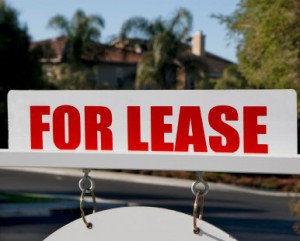Posted by Teresa on March 1, 2013 under Landlord Tips, Legal | 
 First of all, let it be known that we do tenant screening—not tax returns. Therefore, please do not construe this post as tax advice. Get that from a professional. The following is general information that landlords might find useful.
First of all, let it be known that we do tenant screening—not tax returns. Therefore, please do not construe this post as tax advice. Get that from a professional. The following is general information that landlords might find useful.
The housing bubble turned lots of homeowners into landlords, when they couldn’t sell their properties and instead had to rent them out to tenants. These new landlords may not realize what veteran rental property owners know: that one of the advantages of being in the business is the opportunity to offset income by deducting certain expenses from their tax returns.
When you own rental property, you can generally deduct the following:
- Mortgage interest
- Depreciation
- Taxes
- Insurance
- Maintenance and upkeep
- Utilities paid by you
- Upgrades to rental units
- Advertising expenses
- Professional fees (tax advisor, lawyer, bookkeeper)
- Website expenses
- Local travel (including meeting with tenants, checking on units, traveling to hardware stores for parts, etc.)
- Long distance travel related to rental properties
- Cleaning expenses
- Painting, carpet replacement and other repairs done between tenants
- Home office expenses
Rental property offers other benefits, as well. Remember, one day the mortgage will be paid off and the income can help with your retirement, too!
Find a good tax advisor and make sure you get all the deductions you’re entitled to. Make your rental property work hard for you, and don’t pay more in taxes than is required.
Posted by Teresa on January 21, 2013 under Housing Trends | 
 Some of the housing markets hit hard by the housing bubble were Phoenix, Las Vegas, Tampa and several markets in California. As prices fell to rock bottom levels, real estate investors made major purchases in these markets. And now, as prices begin rising, investment groups are looking for the next place to find a bargain.
Some of the housing markets hit hard by the housing bubble were Phoenix, Las Vegas, Tampa and several markets in California. As prices fell to rock bottom levels, real estate investors made major purchases in these markets. And now, as prices begin rising, investment groups are looking for the next place to find a bargain.
In Phoenix, the percentage of homes purchased by investors in November 2012 was 28%, down from August’s mark of 36%. Meanwhile, year-over-year home prices in Phoenix were up 24% in November, compared to 7.4% nationwide.
Investors are looking for new markets to buy homes and convert them to rental properties. According to a recent JPMorgan Chase research report, major institutional investors are planning to invest as much as $10 billion in the single-family rental market. Their targets? Three bedroom, two-bath homes in the $100,000 to $125,000 range. They’ll make repairs, rent them out, and bet on the price appreciating in the next several years.
That figure equals about 80,000 homes, out of approximately 12 million single-family rental homes across the nation, which are mostly owned by individual investors.
Some of the bigger players are:
- The Blackstone Group, which has spent $2.5 billion on 16,000 homes. It is purchasing around 2,500 homes each month.
- Colony Capital, which is investing up to $150 million per month this year, after purchasing 5,000 homes last year.
- Waypoint Homes, which expects to own 10,000 homes by the end of the year.
Many groups started in Phoenix, then went into California, Atlanta, Tampa, Orlando, Chicago, Las Vegas and Charlotte. Some are buying at a faster pace, perhaps because home prices are rising faster than expected. If prices rise above a certain point, they won’t bring high enough rents to make a sound investment.
Real estate markets in Atlanta and Tampa are now seeing the impact of investors coming in, with dozens of offers on foreclosed homes, many by cash-paying buyers. Good buys are becoming harder to find. Individual homebuyers are seeing more competition from small and large investors, resulting in bidding wars and reducing inventories of homes for sale.
Nationwide, investors purchased 19% of homes in November, according to the National Association of Realtors, which is down 23% from January and February 2012. Areas where investor sales are leveling off include Tucson; Oakland; Tacoma, Washington; Washington D.C. and Durham, N.C.
This pattern is expected to continue as home prices rise and investors exit out of markets, then return when prices stabilize.
Posted by Teresa on December 11, 2012 under Rental Market | 
 The tighter credit standards and falling housing prices that followed the housing bubble’s burst led many Americans to become renters, rather than homeowners. Now the economy is getting stronger, and new households are again forming. But increasingly, young Americans and those burned by foreclosure are opting to rent rather than buy.
The tighter credit standards and falling housing prices that followed the housing bubble’s burst led many Americans to become renters, rather than homeowners. Now the economy is getting stronger, and new households are again forming. But increasingly, young Americans and those burned by foreclosure are opting to rent rather than buy.
Yes, much of the U.S. is in a rental market boom. But in the face of a strengthening housing market, will that trend be continuing? And if rents and demand keep rising, but supply doesn’t keep up, will the pendulum swing back toward home ownership?
Analysts expect that a lack of financing as well as the supply of homes for sale will keep the rental market strong, at least in the short term. However, if rents keep going up and home prices stay relatively stable, your tenants could start checking to see if the grass is greener on the home ownership side of the street.
We are in an uncertain point of the economic recovery. Unemployment is dropping, but it is still above 7.5%. Forty percent of the unemployed have been out of work for six months or more. People don’t buy houses when they’re uncertain about their futures.
Younger people were hit hard by the economic and housing market crash, and baby boomers are retiring in huge numbers. Both of these big demographic groups could keep rental markets strong for years to come.
But once we either avoid or fall over the so-called fiscal cliff, some uncertainty will be abated—for better or worse. And what will happen if lawmakers actually start crafting policy to create jobs? Will a more concrete feel for the future embolden renters to become homeowners again?
If rents keep increasing, home ownership will look better and better—especially as wages stagnate. Many people will simply be unable to afford rising rents and will look for alternatives. Even those stung by foreclosures could buy again, especially when FHA loans become available to them again, three years after their proceedings.
Landlords and property managers, it’s clear that staying on top of what’s happening in your local market is the key to staying ahead of the competition. Adjust your rents and target your tenants accordingly.
Start your tenant relationship off right by knowing who you’re leasing to. Protect your rental property and assets with tenant background checks. Proper tenant screening will ensure you are leasing to the best possible tenants.
Posted by Teresa on November 14, 2012 under Landlord Tips, Legal | 
 If you’re a new real estate investor—having purchased property to rent out in 2012—you may qualify for special tax breaks on improvements. But you’ll have just a few months to make them.
If you’re a new real estate investor—having purchased property to rent out in 2012—you may qualify for special tax breaks on improvements. But you’ll have just a few months to make them.
Many new landlords jumped into the business this year, as prices dropped and demand rose. Vacancies are down throughout the country, and rents have been projected to stay stable for the next few years. For lots of investors, 2012 was a good year to get into the real estate rental market.
Attracting quality tenants is perhaps the most important thing to learn for new landlords. But what do good tenants want? In most cases, they want to feel comfortable and safe. For higher-end properties, they also want amenities like wood floors, tile bathrooms, gas fireplaces and upgraded appliances.
If you’re a new landlord thinking of making improvements to your property, ask your tax advisor about the IRS Bonus Depreciation of “personal property improvements” and Increased Section 179 Deduction. Briefly, this section of the tax code allows businesses to write off most or all of the purchase price of qualifying equipment and depreciate updates made in the first year of ownership, with certain limitations and restrictions. It was enacted after 9/11 to encourage businesses to invest in themselves.
December 31 2012 is the deadline; new landlords could qualify for breaks on improvements if they move fast. Some improvements, such as cabinets or new tubs, don’t qualify because they are part of the property. But new appliances, floor coverings, fixtures and paint could qualify—and could help you compete for the best tenants.
Of course, it’s always wise to consult a tax expert BEFORE spending any money that you think you’ll be able to deduct as an expense or depreciate.
Disclaimer:
The contents of this article are intended for general information purposes only, and should not be relied upon as a substitute for obtaining financial or tax advice applicable to your situation. Please consult your tax advisor.
Posted by Teresa on September 18, 2012 under Housing Trends | 
 The United States has long had a policy of promoting homeownership. Federal expenditures in the form of direct spending and tax subsidies benefit homeowners in all income brackets—including those who could afford homes without the subsidies.
The United States has long had a policy of promoting homeownership. Federal expenditures in the form of direct spending and tax subsidies benefit homeowners in all income brackets—including those who could afford homes without the subsidies.
Lower-income families typically spend more of their incomes for housing than higher earners. They also face other housing difficulties, such as instability and even homelessness, which are alleviated by rental assistance programs. However, federal rental assistance programs are currently reaching only one in four eligible tenants, due to limitations on funding.
Policymakers are introducing reforms to the homeownership mortgage interest tax deduction as an attempt to reduce the federal budget deficit. Some say the savings should be funneled to lower income renters in the form of a federal tax credit, administered by the states.
The idea is to provide credits to poor families so they can afford rental housing, to lift them out of poverty and positively impact children’s health and long-term development. Families would pay no more than 30% of their income on rent, while credits would pay the remainder. Landlords would be able to claim a federal tax credit on any rent reductions provided to families, or pass the credit to the mortgage holder in return for a reduction in payments.
Supporters say rental assistance can move the elderly or those with disabilities out of nursing homes and into housing that better meets their needs, provide support for families at risk of having their children placed in foster care and reduce homelessness among veterans and other at-risk groups.
Posted by Teresa on August 29, 2012 under Housing Trends, Rental Market | 
 Whether you’re a parent of a college student or an investor in real estate, some college towns are more attractive than others. In some of the country’s hottest rental markets, landlords who own rental housing are seeing low vacancies and higher rents, while parents of college students might be finding it difficult to buy an investment property for their kids to live in while in school.
Whether you’re a parent of a college student or an investor in real estate, some college towns are more attractive than others. In some of the country’s hottest rental markets, landlords who own rental housing are seeing low vacancies and higher rents, while parents of college students might be finding it difficult to buy an investment property for their kids to live in while in school.
Buying a rental property often makes more sense for parents than paying ever-rising costs of room and board or off-campus rent. But they may be competing with experienced landlords when it comes to purchasing reasonably priced properties in today’s competitive markets.
According to Realtor.com, the following markets show promise for parents and other real estate investors:
| City |
Median Home Price |
Average Rent |
| Boston |
$334,900 |
$3,084 |
| Washington, DC |
$395,000 |
$2,637 |
| Los Angeles |
$358,000 |
$2,290 |
| Princeton, NJ |
$265,000 |
$2,056 |
| Chicago, IL |
$194,000 |
$1,630 |
| Providence, RI |
$259,000 |
$1,527 |
| Philadelphia, PA |
$234,900 |
$1,475 |
| Pittsburgh, PA |
$140,000 |
$1,122 |
| Atlanta, GA |
$175,900 |
$1,187 |
Of course, owning rental property and leasing to college students presents another set of challenges. Study the market, consult your tax, legal and financial advisors, and decide whether the pros and cons work out for your needs and personal situation.
No matter who you are leasing to, you need to protect your rental property and assets with tenant background checks. Proper tenant screening will ensure you are leasing to the best possible tenants.
Posted by Teresa on July 20, 2012 under Landlord Tips, Lease and Rental Agreements | 

Conditions for entering the rental housing market are great right now. Home prices are low, and interest rates are too. Demand for rentals is up, vacancies are low, and are expected to stay that way for the foreseeable future. That means investors could make buying a home and renting it out actually work.
But there are downsides to being a landlord, which any experienced one could explain in great detail. Here are just a few:
- You’ll dread the sound of your phone ringing or buzzing. Too many times, it will be a call or text from a tenant, to inform you of a problem. Overflowing toilets, stopped up sinks, broken appliances or frozen pipes tend to happen when you least want them to—like in the middle of the night, on Christmas Day, or when you’re on vacation.
- Your lease will be ignored. Sure, you’ll spend time and money creating an iron-clad lease to protect yourself and your property. Only trouble is, tenants don’t always read leases—nor do they understand what things like “no pets” really means. And if they do understand what they’re reading, they may think it can’t possibly apply to them. “Fluffy” is just a tiny kitten, so surely you won’t mind if a tenant brings her home, right?
- Tenants will put others in danger. From allowing boyfriends, girlfriends, unemployed kids, ex-spouses or complete strangers to move in without your permission (or knowledge), to using your property as home base for a drug business, some tenants will try to get away with behavior that could put other tenants in danger. They could also leave you liable for their actions—criminal, dangerous or otherwise.
- You may not get the rent on time. Okay, you probably won’t get the rent on time, all the time. Tenants will pay late, or just stop paying completely. In the meantime, you still have a mortgage and other expenses to pay. Landlords need several months’ worth of reserves set aside in the budget.
- There’s a lot of upkeep. Any property requires care. Rental properties get more wear and tear, so they generally need even more maintenance and repairs. Landlords are required to keep their properties in habitable, safe condition for tenants, and professional plumbers and electricians are expensive to hire.
- It’s difficult to get rid of problem tenants. Eviction is not fun, and it’s expensive. In many places, it’s also a very difficult process. To make it worse, some tenants are experts at avoiding eviction, by exploiting laws designed to protect them.
If you’re smart, tough and know how to run a business, landlording could be a good fit for you. Just be picky about the property you buy, and pickier about the tenants you allow to live there. Thoroughly screen all tenants. Run credit checks and criminal background checks with a reputable company. Then, make sure you enforce your rules fairly and consistently.
Posted by Teresa on June 24, 2012 under Eviction, Fair Housing Act, Landlord Tips | 
 If you’re thinking about investing in rental property, particularly as demand for rentals is increasing and housing prices are at the low point in many markets, there is a lot you’ll need to learn. Some aspects of landlording can only be learned through experience, but others are important to understand from the very beginning, to ensure you’re in compliance with property and tenant regulations.
If you’re thinking about investing in rental property, particularly as demand for rentals is increasing and housing prices are at the low point in many markets, there is a lot you’ll need to learn. Some aspects of landlording can only be learned through experience, but others are important to understand from the very beginning, to ensure you’re in compliance with property and tenant regulations.
Even if you’ve been a landlord in the past, you’ll need to brush up on new laws. For example, in many states, certain disclosures are required to protect tenant health. You may be required to reveal exposure to floods, mold or radon. Some states require indoor air tests or other environmental testing. Federal laws require landlords to disclose lead-based paint hazards in buildings built prior to 1978. You may be required to provide smoke detectors, carbon monoxide detectors, or both.
The federal Fair Housing Act prohibits discrimination in renting property based on a person’s race, color, religion, national origin, gender, marital status or disability. Landlords may not prohibit children in rental property, unless it is a senior-only community.
Landlords are required to provide safe and habitable units for tenants, according to local and state housing and health codes. All utilities must be operational. Necessary repairs must be made promptly. Lighting, locks and grounds should be maintained to prevent crime and injuries. Landlords cannot force tenants to move by turning off heat, lights, or water, by changing locks or removing the tenant’s property. Check local statutes for the guidelines and proper process for evicting tenants.
In many states, security deposits are strictly regulated, including the amount that may be charged, where the funds are kept (such as in a separate bank account from rents or in an interest-earning account) and how they are disbursed to former tenants. You may also be limited as to what the security deposit can cover. Some states allow deposits to cover unpaid rent, while others limit their use to just damages. Landlords may be required to refund a security deposit in a certain number of days.
The proper handling of a tenant’s property is another potentially sticky area. When a tenant leaves property behind, you may be required to prepare an inventory and have a law enforcement officer sign off on it. Depending on where you live, a landlord may be prohibited from moving a tenant’s property off the premises; or they may be allowed to dispose of it after a set period of time. Check your local laws to ensure compliance.
Becoming a landlord can be a profitable venture. Just be sure you’re in compliance with local, state and federal laws, or you may have legal fees that can wipe out your potential gain.
Posted by Teresa on April 24, 2012 under Fair Housing Act | 
 Landlords, how closely do you monitor your property managers? Do you allow them to run your properties however they see fit, or do you run a tighter ship? When you realize that a property owner is often liable for the actions taken by those acting on his or her behalf, you may want to consider keeping a closer eye on your manager.
Landlords, how closely do you monitor your property managers? Do you allow them to run your properties however they see fit, or do you run a tighter ship? When you realize that a property owner is often liable for the actions taken by those acting on his or her behalf, you may want to consider keeping a closer eye on your manager.
For example, one rental property owner was surprised to hear that her long-time property manager had been “protecting the property” by rejecting lease applicants with children. This action is in violation of federal fair housing laws, which prohibit discrimination against applicants on the basis of race, color, national origin, religion, sex, familial status or handicap. Even through the property manager was acting on her own, the building owner still has the responsibility to supervise her staff and prevent any discriminatory actions from taking place.
In a related case, an apartment property manager was found to be turning on the lawn sprinklers whenever children who lived in the complex were playing outside. By his actions, he was creating a hostile environment for the families with children, who were forced to keep the kids inside. If a tenant complained to the local fair housing agency, the landlord could end up as the target of an investigation.
A third example is the property owner who received a letter from a tenant, complaining about the resident manager. The tenant said the male manager was too friendly with her teenage daughter, and was frequently seen near the apartment when the girl was home alone. This behavior, which also creates a hostile environment is often classified as sexual harassment—and is also illegal under the federal Fair Housing Act. Even though no actual inappropriate actions had yet been taken, the daughter’s discomfort is significant enough to warrant action by the property owner.
In many cases, rental property owners are just a complaint away from a discrimination lawsuit—whether or not they are aware of the illegal activities of their property managers. The best bet is to keep a close eye on what’s going on at your properties. Remember, you are ultimately responsible for every decision or action by a property manager that affects your tenants.
Posted by Teresa on January 6, 2012 under Landlord Tips | 
 The declining housing market created plenty of new landlords, some of whom may have never planned on owning rental property. Some are leasing a house they couldn’t sell, while others are taking advantage of low prices and investing in properties to rent. Still others are renting out floors or rooms in their own homes.
The declining housing market created plenty of new landlords, some of whom may have never planned on owning rental property. Some are leasing a house they couldn’t sell, while others are taking advantage of low prices and investing in properties to rent. Still others are renting out floors or rooms in their own homes.
One thing all landlords need is proper liability insurance coverage on their rental properties:
- If you’re renting a room or section of your own home, you will probably be okay with your existing homeowner’s insurance coverage.
- If you don’t live in the same house with your tenants, you’ll likely need a separate policy.
Why Do You Need Landlord Liability Insurance?
Imagine losing your savings over a lawsuit brought by a tenant because of an injury suffered on your property. Or if a neighbor’s child is bitten by your tenant’s dog on the sidewalk in front of your property. Even a visitor to your tenant’s unit could possible sue if he or she is injured on your property through no fault of yours.
Will your retirement fund be wiped out? What about your kids’ college funds? Could you lose your home, as well as your rental property? All of these assets could be at risk when you begin renting out a property you own without proper liability insurance.
Check with your insurance provider about your options. They may include:
- Basic coverage, for fire and vandalism.
- The next level of coverage will typically include acts of nature, such as windstorms.
- The top tier, an “open peril” policy, covers all perils, except those specifically named.
Some insurance companies offer special landlord insurance packages, which typically cover damages to your building and outbuildings, as well as your personal property stored on site. Some offer loss-of-rental-income and legal defense and court cost coverage.
If you’re a new landlord who hasn’t yet looked into insurance, your next call should be to your insurance agent!
Legal disclaimer:
The contents of this article are intended for general information purposes only, and should not be relied upon as a substitute for obtaining legal advice applicable to your situation.
 First of all, let it be known that we do tenant screening—not tax returns. Therefore, please do not construe this post as tax advice. Get that from a professional. The following is general information that landlords might find useful.
First of all, let it be known that we do tenant screening—not tax returns. Therefore, please do not construe this post as tax advice. Get that from a professional. The following is general information that landlords might find useful.








